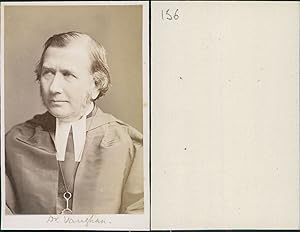Descripción
Photographie,vintage CDV albumen carte de visite, Dr Vaughan Charles John Vaughan was educated at Rugby and Cambridge; he was ordained in 1841 and three years later was appointed headmaster of Harrow. He resigned unexpectedly in 1859, and in 1863 accepted the bishopric of Rochester, but shortly afterwards inexplicably withdrew his acceptance. For more than a century, no one knew either the reason for his resignation from Harrow or for his sudden change of mind over the bishopric of Rochester. Speculation ranged from exhaustion to a pious attempt to rein in his ambition. It wasn?t until the 1970s, when the memoirs of John Addington Symonds came to light, that an explanation for Vaughan?s conduct was finally provided. Symonds was an early advocate of the validity of male-male sexual love and had been a pupil at Harrow during Vaughan?s time as headmaster. Harrow, like most nineteenth-century boarding schools, was a jungle of brutality and homosexual lust. The prettier boys were all given female nicknames and the prettiest of each community was passed around as the ?house tart.? Vaughan, while seeming to disapprove of such practices, was, it transpired, all the while a slave to a passion of his own, one he was unable to control. The object of his affections was not his new wife but an eleven-year-old pupil by the name of Alfred Pretor. When Pretor sent his friend Symonds a letter confiding that he was having an affair with their headmaster, at first Symonds didn?t believe him; but when Pretor showed him the numerous love letters he had received from Vaughan, Symonds was deeply shocked. He did nothing for eight years, but the secret festered and in 1859, by now up at Oxford, he blurted out the whole story to his Latin professor, John Conington. Horrified, Conington encouraged Symonds to tell his father, advice which Symonds followed. Dr Symonds didn?t hesitate and immediately wrote Vaughan a letter informing him that he knew everything about his relationship with Pretor but would not expose him publicly if Vaughan resigned his position at once and agreed never to accept high office in the church. A long confrontation took place, of which there is no record, but Vaughan finally acquiesced. On 16 September he sent a circular letter informing all the parents that ?I have resolved after much deliberation, to take that opportunity of relieving myself from the long pressure of these heavy duties and anxious responsibilities which are inseparable from such an office, even under the most favourable circumstances.? The following year, the prime minister Palmerston, who was chairman of the board of the Harrow governors, offered Vaughan the bishopric of Rochester and he accepted the appointment, presumably in the belief that Symons senior would not enforce his edict. He was wrong; Symonds immediately sent Vaughan a telegram ordering him to withdraw or risk public exposure. Vaughan resigned, only a few days after he had accepted the see, and instead settled for the relatively obscure position of vicar of Doncaster. When Dr Symonds died in 1871, Vaughan was finally free to accept advancement within the church and in 1879 he became the dean of Llanduff in Wales. On his death in 1897 he left instructions that all his papers should be destroyed and forbade any biographies of him to be written. As a footnote, it should be pointed out that the story of Vaughan?s relationship with Pretor and his subsequent blackmail by Dr Symonds is problematic. It rests solely on the memoirs of the younger Symonds ? and he mistakenly places the events he describes in 1863 ? and there is no evidence to support his claims. Moreover, he was not the recipient of the letters and was at the time of the alleged events struggling to come to terms with his own homosexuality. // Circa 1870 // CDV, tirage albuminé, 6 x 10.5 cm, vintage albumen print // Format (cm): 6,5x10,5. N° de ref. del artículo PD8534
Contactar al vendedor
Denunciar este artículo
![]()
